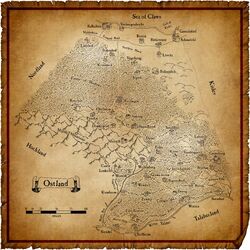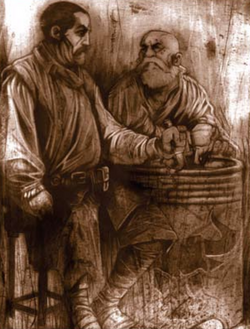"And as we lay here prostrate, Nordland and Talabecland plot to land the final blow..."
- —Elector Count Valmir von Raukov[1a]
Ostland, formally the Grand Principality of Ostland, is a founding Electoral Province of the Empire that makes up much of the northern border of that nation. Ostland is a realm of damp, creeping mists and shifting shadows, and is covered almost entirely by the dark canopy of the Forest of Shadows. The people of this land have learned to live out a rugged life among the ancient trees, clearing patches of land for their farms and settlements, and keeping a watchful eye on the dark depths of the forest.[1a]
As the first line of defence for the Empire's northern frontier, the province of Ostland is in a state of near-constant war. Chaos warbands and Norscan marauders raiding from the north are simply a fact of life for Ostlanders, and such harsh living has created a militaristic society in Ostland similar to those which exist in the neighbouring provinces of Nordland and Middenland.[1a]
As the descendants of the ancient tribe of Men known as the Udoses who inhabited what would become Ostland in the times of Sigmar over two and a half millennia ago, Ostlanders have since earned a reputation amongst the peoples of the other Imperial provinces as a stubborn yet patriotic citizenry, who have fought, bled, and endured countless invasions since before the founding of the Empire.[1a]
A popular Ostlander phrase is "A wolf at the door is still a wolf."[2a]
Geography[]
"Let us do what we can for them, of course. But I fear Ostland may be lost, our efforts notwithstanding."

A map of Ostland
Shaped like an arm wrapped around the shoulders of the Middle Mountains, almost the whole of the province of Ostland is covered by the ominous Forest of Shadows. Long ago, during the expansions of the first millennium, the Counts of Ostland pushed their boundaries deep into what would become Kislev, founding colonies to hold what they had taken. These efforts eventually failed, with Ostland forced to renounce her last claims to Kislevite territory at the time of the Ungol invasions, thanks to the treachery of the Talabheim Emperors. Now the only territory of Ostland not covered in forest are the wind-swept grasslands of the Northern March from Salkalten to the Kislev border.[1a]
Ostland is a land ravaged by war, with many areas warped by Chaos. Some openly doubt whether she can recover. The Forest of Shadows, which runs southwest from the Nordland border to the river Talabec, is what most people think of when they think of Ostland. Dark, dreary, and overgrown, the Forest of Shadows is like a mad wizard’s attic. Many bizarre secrets lie within it, some older than the Empire and best left undiscovered.[1a]
The forest does not give up its secrets easily, and many residents of Ostland are sure the forest resents their presence, and that even after thousands of years, it has never adjusted to having Humans and their axes and fires under its eaves. Woodsmen and others who venture deep into the forest are sure that, sometimes, when they are not looking, the forest redraws the paths through it to confuse those who anger it, and perhaps even cause their deaths.[1a]
The Forest of Shadows not only is home to large amounts of game, such as deer and boar, but also fell creatures such as Giant Spiders, who wait for Men, Dwarfs, and Halflings to stumble into their sticky traps. Even the plant life can be deadly; amidst the thick undergrowth lurks Bloodsedge, a thorny bramble with animal intelligence that feeds on the blood of living things caught in its grasp.[1a]
The Middle Mountains dominate the southwest of Ostland. Claimed by all the lands surrounding them, Ostland, Hochland, Middenland, and even Nordland, the Middle Mountains are dominated by none. It was once home to a kingdom of Dwarfs who broke away from the Dwarf Empire, Karaz Ankor, during the war against the Elves. Soon after the Greenskins and Skaven fell on the Dwarf Empire and ravaged it, however, the Dwarfs of “Karaz Ghumzul” abandoned their hold and fled the Middle Mountains to return to Karaz Ankor. They sealed the doors, buried them under rock, and destroyed the roads that led to it.[1a]
To this day, the Dwarfs will not say what drove their people from Karaz Ghumzul, but, as they left the mountains near where Castle Lenkster now stands, the Dwarf priests pronounced a curse on the mountains and everything within them. Since then, many prospectors and adventurers have searched for the lost Dwarf mines, but none have succeeded, unless they are among those who have never returned.[1a]
Northern March[]
The Northern March, often just called "The March," is a region of Ostland situated near the Sea of Claws. The coastal towns dotted along these blustery grasslands stretch from the Erengrad to the Middenheim Roads. The revenues from this traffic are important to the Grand Prince of Ostland, and the duties he sets are often a bone of contention with Middenheim.[3a]
Ruled by the Grand Prince's vassal known as the Margrave of the North from the fortress at SchÖnfeld, the Northern March has tried to capture some of the sea traffic between Kislev and the west, but ships usually bypass the sleepy ports of Salkalten, Stielstand, and Sieverhof in favour of Marienburg. Instead, the March's prime exports are salted fish and a pungent sheep's milk cheese, leading to the common nickname for the Northern March's inhabitants in Ostland, "Cheeseheads."[3a]
Inhabitants[]
"In the mud, with the blood and the beer!"
- —An old Wolfenburg toast[1a]

Those bull-headed Ostlanders really will eat anything...even rat
Ostlanders have a reputation for being bull-headed, and, among their Imperial brethren, it is an open question as to which would win in a contest of wills between a Dwarf and an Ostlander who has made up his mind on a matter. Descended from the ancient tribe of the Udoses, the Ostlanders have been known for mulishness since the earliest days of the Empire.[1a]
When Sigmar called the tribes to arms at the Great Moot before the Battle of Black Fire Pass, it is said that it took him three days of argument to convince Wolfila, the Udosian chief, to join. And, when it became clear to everyone else early in the Second Millennium that the Kislevite territories could not be held, the Counts of Ostland insisted on spending blood and treasure to hold on, no matter how much it weakened them.[1a]
Notoriously thrifty, Ostlanders are known for their ability to survive. Said to be capable of eating anything, there are several mocking songs about the famous ‘Stone soup of Ostland’ They are so creative in their frugality that a common joke in the Empire claims that Ostlanders make ‘stone soup’ with only one stone, for fear of wasting good rocks. While an exaggeration, it is true that Ostlanders are skilled in getting the most use out of what they have to work with and for being loath to throw anything away that might still be useful. This conservatism has at times cost them, as when von Raukov’s predecessors refused to adopt gunpowder weapons, because that would mean wasting perfectly good swords and spears.[1a]
At their best, Ostlander are cool-headed in a crisis, practical, and not given to airs and graces. They are proud survivors, and teach their offspring to hold their heads high, despite the circumstances. At their worst, Ostlanders are overly stubborn, proud, and intolerant. Short shrift is given to those who complain of hardship, and they hate waste of all sorts, as well as “needless ostentation.” A strong streak of jealousy against the so-called “breadbasket” provinces of Reikland, Stirland, Averland, and the Moot rises up in drunken rages. More than ever, stout soldiers are toasting old glories with Kislev Vodka, sinking into drunken stupors or violent rampages.[1a]
Ostlanders, like most Imperials, honour all the gods and celebrate their feast days. If one god is favoured over another, however, it is Sigmar, who is worshipped with a degree of devotion not often seen north of the Empire. Surrounded by lands that lean toward Ulric, Taal and Rhya, few know why this is so, though many offer explanations. Devout Ostlanders say it stems from the time when, soon after the founding of the Empire, a great dragon ravaged Ostland. The other electors and their armies were afraid to face the beast, so Sigmar came alone and killed it after a great fight alongside the Ostland Count. On the other hand, cynics suggest that Ostlanders are so devoted because their “poor cousin” Electors have to keep borrowing money from wealthy Reiklanders and thus need to keep them happy. Whatever the truth, it is a fact that even the smallest Ostlander village sports multiple shrines to Sigmar.[1a]
Ostlanders are known for the strange pacing and Kislevite tones of their speech. They frequently pause in the middle of a sentence. The Ostlander accent is seldom imitated in the Empire as it is associated with poverty.[1a]
Trivia[]
Like many of the Empire's Electoral Provinces, "Ostland" is actually German for "Eastern Land," denoting its location in the Empire.
